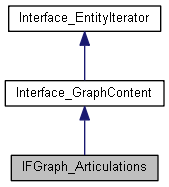this class gives entities which are Articulation points in a whole Model or in a sub-part An Articulation Point divides the graph in two (or more) disconnected sub-graphs Identifying Articulation Points allows improving efficiency of splitting a set of Entities into sub-sets More...
#include <IFGraph_Articulations.hxx>

Public Member Functions | |
| IFGraph_Articulations (const Interface_Graph &agraph, const Standard_Boolean whole) | |
| creates Articulations to evaluate a Graph whole True : works on the whole Model whole False : remains empty, ready to work on a sub-part | |
| void | GetFromEntity (const Handle< Standard_Transient > &ent) |
| adds an entity and its shared ones to the list | |
| void | GetFromIter (const Interface_EntityIterator &iter) |
| adds a list of entities (as an iterator) | |
| void | ResetData () |
| Allows to restart on a new data set. | |
| virtual void | Evaluate () override |
| Evaluates the list of Articulation points. | |
 Public Member Functions inherited from Interface_GraphContent Public Member Functions inherited from Interface_GraphContent | |
| Interface_GraphContent () | |
| Creates an empty GraphContent, ready to be filled. | |
| Interface_GraphContent (const Interface_Graph &agraph) | |
| Creates with all entities designated by a Graph. | |
| Interface_GraphContent (const Interface_Graph &agraph, const Standard_Integer stat) | |
| Creates with entities having specific Status value in a Graph. | |
| Interface_GraphContent (const Interface_Graph &agraph, const Handle< Standard_Transient > &ent) | |
| Creates an Iterator with Shared entities of an entity (equivalente to EntityIterator but with a Graph) | |
| void | GetFromGraph (const Interface_Graph &agraph) |
| Gets all Entities designated by a Graph (once created), adds them to those already recorded. | |
| void | GetFromGraph (const Interface_Graph &agraph, const Standard_Integer stat) |
| Gets entities from a graph which have a specific Status value (one created), adds them to those already recorded. | |
| Interface_EntityIterator | Result () |
| Returns Result under the exact form of an EntityIterator : Can be used when EntityIterator itself is required (as a returned value for instance), without way for a sub-class. | |
| void | Begin () |
| Does the Evaluation before starting the iteration itself (in out) | |
 Public Member Functions inherited from Interface_EntityIterator Public Member Functions inherited from Interface_EntityIterator | |
| Interface_EntityIterator () | |
| Defines an empty iterator (see AddList & AddItem) | |
| Interface_EntityIterator (const Handle< TColStd_HSequenceOfTransient > &list) | |
| Defines an iterator on a list, directly i.e. without copying it. | |
| void | AddList (const Handle< TColStd_HSequenceOfTransient > &list) |
| Gets a list of entities and adds its to the iteration list. | |
| void | AddItem (const Handle< Standard_Transient > &anentity) |
| Adds to the iteration list a defined entity. | |
| void | GetOneItem (const Handle< Standard_Transient > &anentity) |
| same as AddItem (kept for compatibility) | |
| void | SelectType (const Handle< Standard_Type > &atype, const Standard_Boolean keep) |
| Selects entities with are Kind of a given type, keep only them (is keep is True) or reject only them (if keep is False) | |
| Standard_Integer | NbEntities () const |
| Returns count of entities which will be iterated on Calls Start if not yet done. | |
| Standard_Integer | NbTyped (const Handle< Standard_Type > &type) const |
| Returns count of entities of a given type (kind of) | |
| Interface_EntityIterator | Typed (const Handle< Standard_Type > &type) const |
| Returns the list of entities of a given type (kind of) | |
| virtual void | Start () const |
| Allows re-iteration (useless for the first iteration) | |
| Standard_Boolean | More () const |
| Says if there are other entities (vertices) to iterate the first time, calls Start. | |
| void | Next () const |
| Sets iteration to the next entity (vertex) to give. | |
| const Handle< Standard_Transient > & | Value () const |
| Returns the current Entity iterated, to be used by Interface tools. | |
| Handle< TColStd_HSequenceOfTransient > | Content () const |
| Returns the content of the Iterator, accessed through a Handle to be used by a frontal-engine logic Returns an empty Sequence if the Iterator is empty Calls Start if not yet done. | |
| void | Destroy () |
| Clears data of iteration. | |
| virtual | ~Interface_EntityIterator () |
| Destructor. | |
Additional Inherited Members | |
 Protected Member Functions inherited from Interface_EntityIterator Protected Member Functions inherited from Interface_EntityIterator | |
| void | Reset () |
| Allows subclasses of EntityIterator to reevaluate an iteration. | |
this class gives entities which are Articulation points in a whole Model or in a sub-part An Articulation Point divides the graph in two (or more) disconnected sub-graphs Identifying Articulation Points allows improving efficiency of splitting a set of Entities into sub-sets
| IFGraph_Articulations::IFGraph_Articulations | ( | const Interface_Graph & | agraph, |
| const Standard_Boolean | whole ) |
creates Articulations to evaluate a Graph whole True : works on the whole Model whole False : remains empty, ready to work on a sub-part
|
overridevirtual |
Evaluates the list of Articulation points.
Reimplemented from Interface_GraphContent.
| void IFGraph_Articulations::GetFromEntity | ( | const Handle< Standard_Transient > & | ent | ) |
adds an entity and its shared ones to the list
| void IFGraph_Articulations::GetFromIter | ( | const Interface_EntityIterator & | iter | ) |
adds a list of entities (as an iterator)
| void IFGraph_Articulations::ResetData | ( | ) |
Allows to restart on a new data set.